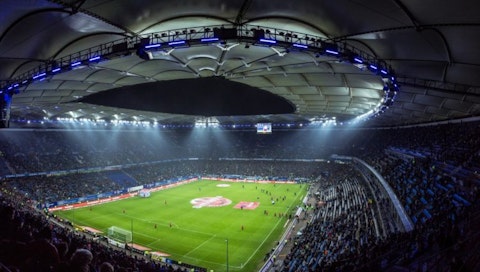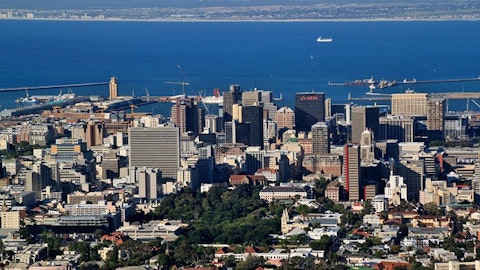In this article, we will be taking a look at the 25 best sports stadiums in the world. To skip our detailed analysis, you can go directly to see the 5 best sports stadiums in the world.
Sports have always been immensely popular in the general population, be it Roman charioteers thousands of years ago or stars across various sports now. After all, even today, the top two personalities on Instagram, with the most followers in the world (over one billion combined) are both footballers. 9 of the top 10 posts on Instagram, including the most-liked picture in history, are from Messi and Ronaldo as well, just signifying how sports are continuing to increase in popularity. According to Globe Newswire, the global sports industry was worth $486 billion in 2022 and grew to $512 billion in 2023 at a CAGR of 5.2%. In the next four years, the CAGR is expected to remain above 5% and will deliver a valuation of nearly $624 billion in 2027.
Because of the huge amounts of money in sports, many billionaires, major corporations and even countries are starting to buy sports team across various franchises as they continue to become more valuable. One of the biggest reasons behind this is lucrative television broadcasting deals. In the Premier League, the richest league in soccer and also home to some of the best sports stadiums in the world, the league’s collective broadcasting deals are worth £4.8 billion from 2022/2023 to 2024/2025 and increase consistently across the years. More and more companies are also attempting to get into broadcasting deals with the traditional heavyweight in Sky Sports being challenged by BT and Amazon Prime Video. Meanwhile, the NBA currently ears $2.6 billion every year from The Walt Disney Company (NYSE:DIS) and Warner Bros. Discovery, Inc. (NASDAQ:WBD). Separately, the NFL has a long-term television rights deal which will earn it around $100 billion across a decade.

Photo by Mario Klassen on Unsplash
There are various other sports and leagues across the world earning billions, which is why billionaires such as the Glazers Family (though not among the richest families in the world) purchased Manchester United plc (NYSE:MANU) and Mark Cuban purchased the Dallas Mavericks, which isn’t one of the most valuable sports companies in the world but is not far off. The Glazers family bought Manchester United plc (NYSE:MANU) for £790 million in 2005 and now, less than two decades later, are looking to sell it for £1.8 billion, which will provide a hefty return on their investment, with one of the allures of the club being its stadium Old Trafford, considered to be among the most famous and beautiful stadiums in Europe, and the world as well. In addition, nowadays, Middle Eastern countries are showing a huge interest in major football teams with some of those being home to the best sports stadiums in the world, starting with the purchase of Manchester City by Sheikh Mansour in 2008 while investing heavily in it, propelling it from mediocrity to winning prestigious trophies including the most prestigious club football trophy in the UEFA Champions League in 2023. Meanwhile, Paris Saint German, a French football team is owned by Qatar Sports Investments, which in turn is owned by the Qatari government. Realizing the importance of being able to improve its global image through sports, Qatar also hosted the FIFA World Cup 2022, spending billions but achieving a level of goodwill hard to come by in any other way, in a move many have decried as sportswashing. Nowadays, Saudi Arabia has entered the fray, not only paying exorbitant amounts to Cristiano Ronaldo to lure him from Manchester United, but offering generational wealth to many other footballers in a bid to improve its league structure.
One of the most important assets a sports team has is its stadium. Nowadays, stadiums are an important part of sports culture, no matter what the sport is, and a team’s influence is also somewhat tied to the quality of the stadium it owns. Further, the bigger a stadium, the higher number of seats it has and the greater the revenue that can be earned on each matchday, which is why some of the best sports stadiums in the world are also those with a high capacity. Nowadays, many sports stadiums are being used not just for sporting events for the local team but for hosting concerts and hosting other sports teams too. The amenities offered are extravagant too, from skywalks to cheese rooms to luxurious suites. Take Tottenham Hotspur Stadium for example. Built in 2019, the stadium cost over £1 billion and even though the club had to take on a huge debt for its construction, its important to the club’s ambitions cannot be understated. These stadiums also contain commercial kitchens and hospitality sections. Due to the specialized commercial kitchens and intricate lighting systems required, the budget for a full hospitality fit out often exceeds that of standard office construction.
Another way that a stadium earns significant money for its sports team is through licensing naming rights. The reason Tottenham Hotspur Stadium is still named as such is because of the fact that its naming rights are yet to be sold. Generally, companies pay top dollar to have their name associated with a stadium, especially if its among the best stadiums in the world, for a defined period of time. One of the most famous examples of this is the MetLife Stadium which is the home of the New York Giants and the New York Jets, whose naming rights were purchased by MetLife, Inc. (NYSE:MET), one of the biggest insurance companies in the world. Meanwhile, Spotify Technology S.A. (NYSE:SPOT) acquired rights to one of the most historic stadiums in Europe in Barcelona’s Camp Nou stadium, home to F.C. Barcelona, in a deal worth $310 million. We will further discuss later some of the best stadiums in the world and the companies who own their naming rights.
The impact of stadiums could also be felt during the coronavirus pandemic, when teams often had to play in empty stadiums because of social distancing measures. A unique solution to this could be through the use of VR or AR, where possibilities include allowing the user to feel as if they are at the stadium and even view the match from multiple angles. While this technology still seems to be in its infancy, linking sports to the metaverse could result in a hugely mutually beneficial relationship.
Methodology
To determine the best sports stadiums in the world, we consulted several websites including Google Arts & Culture, Bleacher Report, At the Buzzer and Sports Management Degree Hub, which have already assessed such stadiums, including the best sports facilities in the world. We then calculated the average ranking of each stadium based on the number of lists they appeared in. Where one stadium only appeared in one list, the list’s rank was the one assigned to it. For stadiums which tied in rankings, we ranked higher the stadiums with a bigger capacity, which is why some of these stadiums are also among the top 20 biggest stadiums in the world. We also excluded some of the most famous venues in the world including racecourses and golf courses which are technically not stadiums, in addition to stadiums with a capacity under 10,000.
25. Madison Square Garden
Capacity: 19,500
One of the most iconic stadiums in the world, Madison Square Garden has been home to some of the most famous events of all-time, including Stanley Cup Finals, NBA Finals and concerts from some of the biggest celebrities in the world. It is owned by Madison Square Garden Entertainment Corp. (NYSE:MSGE).
24. Raymond James
Capacity: 75,000
Raymond James Stadium is home to the Tampa Bay Buccaneers in the NFL. Raymond James Financial, Inc. (NYSE:RJF), a financial services firm, owns the naming rights to the stadium.
23. Allianz Arena
Capacity: 75,024
Allianz Arena is home to the most successful team in German soccer, Bayern Munich and the naming rights are held by Allianz, one of the biggest pharmaceutical companies in Europe.
22. Little Caesars Arena
Capacity: 20,500
Little Caesars Arena is located in Detroit and is a multi-purpose stadium which was built for nearly $900 million.
21. M. Chinnaswamy Stadium
Capacity: 32,000
India has multiple entries in the best stadiums in the world starting with M. Chinnaswamy Stadium which is a cricket stadium in Bangalore.
20. Cape Town Stadium
Capacity: 55,000
Cape Town Stadium is also called the DHL Stadium and is an association football and rugby union stadium in South Africa.
19. Yale Bowl
Capacity: 64,246
One of the most historic stadiums in the country having been established in 1914, the Yale Bowl is home to the Yale Bulldogs.
18. Olympiastadon
Capacity: 74,475
Olympiastadon is located in Berlin and was initially built for the 1936 Olympics.
17. London Stadium
Capacity: 80,000
Built for the London Olympics in 2012, the London Stadium controversially became the home of Premier League team West Ham United, and is one of the few Premier League stadiums in our list of the best stadiums globally.
16. Caesers Superdome
Capacity: 83,000
Caesers Superdome in Louisiana is home to the New Orleans Saints in the NFL.
15. Beijing National Stadium
Capacity: 80,000
The Beijing National Stadium is also called the Bird’s Nest because of its shape and is considered to be among the best stadiums in the world, and was used primarily throughout the 2008 Olympics in Beijing.
14. PNC Park
Capacity: 38,000
PNC Park is a baseball stadium in Pittsburgh, and The PNC Financial Services Group, Inc. (NYSE:PNC) owns the naming rights of the stadium through 2031.
13. Wrigley Field
Capacity: 41,649
Wrigley Field is one of the best stadiums in the world to watch a baseball game in, and is home to the Chicago Cubs. It is also one of the oldest stadiums in the world having been created in 1904. You might think that the stadium is named for Wrigley Company owned by Mars Inc, one of the biggest private companies in the world, but it was actually named after Wrigley’s CEO and avoided selling the stadium’s naming rights to corporates.
12. Yankee Stadium
Capacity: 46,537
One of the most famous stadiums in the world, Yankee Stadium is of course home to the New York Yankees in MLB, and also home to New York City FC in Major League Soccer. It is one of the most expensive stadiums ever built at a total cost exceeding $2 billion.
11. Los Angeles Memorial Coliseum
Capacity: 77,500
One of the best stadiums in the world, Los Angeles Memorial Coliseum is owned by the University of Southern Carolina and will host the Olympics for the third time in 2028. United Airlines Holdings, Inc. (NASDAQ:UAL) became the first company to own naming rights to the stadium in 2018.
10. Wimbledon
Capacity: 42,000
Wimbledon is one of the most historic stadiums in the world, with its history spanning 146 years, making it the oldest tennis tournament in the world. It has the world’s longest running sporting sponsorship from Slazenger, which has provided balls for Wimbledon for over 120 years now. However, the stadium is unique in the fact that it minimizes sponsorships and advertising.
9. Notre Dame Stadium
Capacity: 77,622
There are multiple college football stadiums among the best stadiums in the world and Notre Dame is no exception, home to the University of Notre Dame football team.
8. Stadion Narodowy
Capacity: 58,145
The national stadium in Warsaw, the stadium is called PGE Narodowy since PGE Polska Grupa Energetyczna bought the naming rights. The company also bought the naming rights for the football stadium in Gdansk for around 8.5 million euros over a period of five years.
7. Wembley Stadium
Capacity: 90,000
Considered to be the best stadium in England, despite huge competition from the likes of Tottenham Hotspur Stadium, Stamford Bridge and Old Trafford, the home matches of the English football team are hosted in Wembley.
6. Olympic Stadium Canada
Capacity: 56,000
Olympic Stadium Canada is a multi-purpose stadium in Montreal also known by its nickname “The Big O”. Built in the 1970s as the main venue for the Olympics, it can host baseball, soccer and football events.
Click to continue reading and see the 5 Best Sports Stadiums in the World.
Suggested articles:
- 15 Best Scannable Fake ID Websites in 2023
- 15 Best Places to Retire in South Carolina
- 16 Hardest Languages To Learn For English Speakers
Disclosure: None. 25 best sports stadiums in the world is originally published at Insider Monkey.





